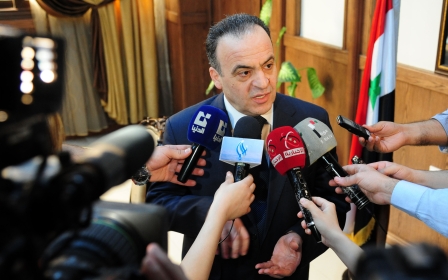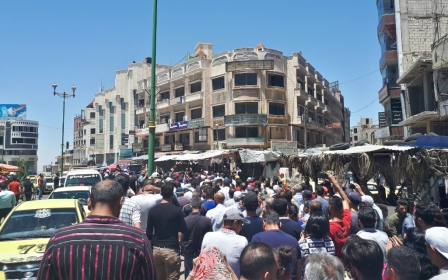Turkish currency begins to spread in Syria in blow for crisis-hit Damascus
Turkey has begun circulating its currency in rebel-held areas in northern Syria, as the Syrian pound continues to collapse in value.
The lira is currently being used in exchange shops in Idlib province and the Posta Telgraf Telefon offices (PTT) in Turkish-controlled north of Aleppo, according to locals.
'Everyone is trying to get rid of the Syrian pound because it is constantly falling apart'
- Eid al-Hussein, Idlib activist
"Everyone is trying to get rid of the Syrian pound because it is constantly falling apart," Eid al-Hussein, a displaced activist from eastern Idlib, told Middle East Eye.
“Gas stations, food shops, restaurants, clothing stores and some ovens have started to deal with Turkish lira."
Recent weeks have the Syrian pound plummeting in value, provoking rare anti-government demonstrations in the south of the country.
New MEE newsletter: Jerusalem Dispatch
Sign up to get the latest insights and analysis on Israel-Palestine, alongside Turkey Unpacked and other MEE newsletters
The increasing demand for the Turkish lira in rebel-held areas, however, is beginning to create chaos in Idlib, according to Muhammad Bahjat al-Eis, a displaced activist from the region.
“In the morning there was a man wandering around carrying a million Syrian pounds, trying to exchange it for the dollar or the Turkish lira, without finding someone to buy it,” he said.
“Many people still have Syrian currencies, they do not know where and how they will get rid of it before it collapses more.”
This has led to a significant decline in the purchase of the Syrian pound, as each Turkish lira is being sold at 550 Syrian pounds, instead of the official price of less than 400 Syrian pounds.
Total collapse
The collapse in the Syrian currency comes in the wake of nine years of war that exhausted the country and the United States' announcement of a raft of stringent laws known as the Caesar Syria Civilian Protection Act.
"Caesar" refers to the Syrian secret witness who leaked nearly 50,000 shocking images of the bodies of detainees brutally killed by Syrian intelligence they were detained for participating in protests against Syrian President Bashar al-Assad in early 2011.
The local currency recorded its worst collapse since the founding of the Syrian Arab Republic, with the exchange rate reaching about 2,700 Syrian pounds to the dollar, compared to about 50 Syrian pounds to the dollar in 2011.
The Caesar sanctions target all countries that support Assad. Russia and Iran support Assad's forces against the opposition.
Syrian and Russian air strikes have resulted in a heavy civilian death toll, as well as destroying hospitals, schools, and even religious monuments.
Last week, demonstrations erupted in opposition-held Idlib to condemn corruption with the demonstrators accusing the local authorities in Idlib of being behind the economic collapse.
After that, the Shura Council in Idlib - the highest advisory authority - decided to work on spreading the Turkish currency and disposing of the Syrian currency as soon as possible.
Previous plans
The decision to change the currency is a major win for Turkey and a blow for Damascus, according to Ibrahim Tadfi, an economist based in northern Aleppo.
In late 2019, Abd al-Rahman Mustafa, head of the Turkey-based Syrian Interim Government, said that the government would work to put Turkish monetary classes on the market, and the opposition's minister of economy held a dialogue seminar to discuss the challenges of currency replacement.
“Personnel in the national army and police forces, along with education and services sector employees, north of Aleppo, receive their salaries in Turkish lira,” Tadfi told MEE.
"Besides, Turkey has for years opened centers like PTT, which is like a small bank, and a means of transferring money between Turkey and Syria," he added.
“The absence of a central bank constantly affects the value of the currency in northern Syria, and leaves it floundering on the black market.”
He said the currency change would reduce losses for traders, because they would adhere to a specific price from the Turkish Central Bank.
This year, the Turkish currency lost 13 percent of its value - Tadfi said that offering the Turkish currency in Syria would help increase demand for it and thus raise its value.
“It also contributes to a decrease in demand for the Syrian currency and a decrease in its value, and stopped supplying merchants to Damascus with foreign currencies in order to obtain the Syrian currency,” he added.
Middle East Eye delivers independent and unrivalled coverage and analysis of the Middle East, North Africa and beyond. To learn more about republishing this content and the associated fees, please fill out this form. More about MEE can be found here.




